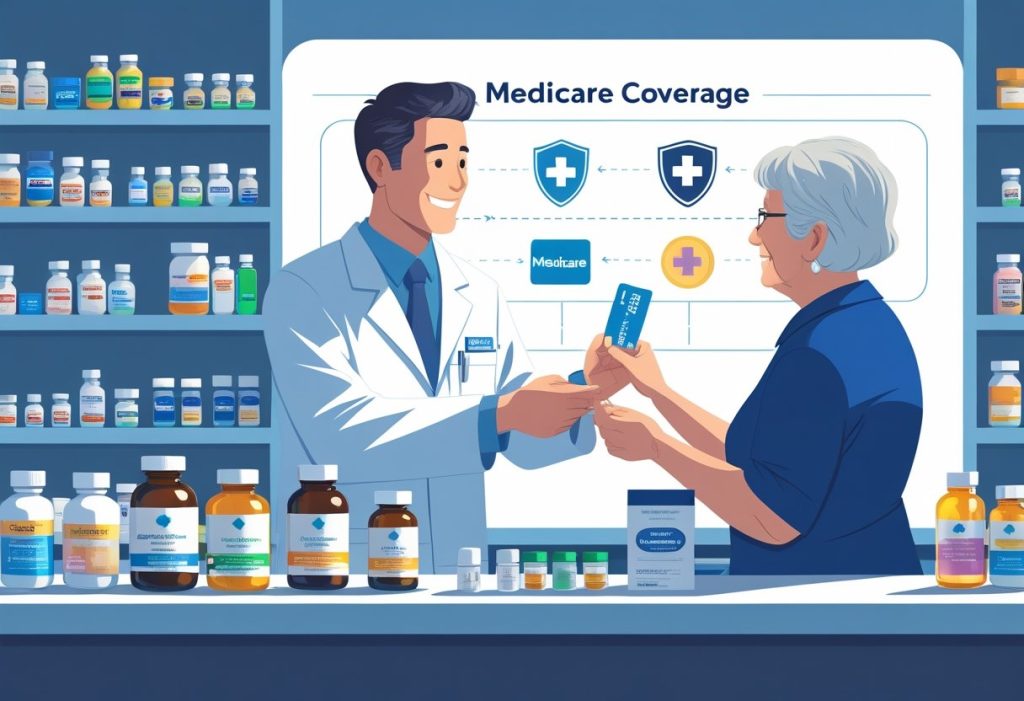Navigating the world of Medicare can be complex, especially when it comes to understanding coverage for over-the-counter (OTC) drugs. Original Medicare does not cover OTC drugs, which often leaves many wondering about their options. However, Medicare Advantage plans may offer additional benefits, including coverage for certain OTC products.
As you explore your Medicare options, it’s essential to know what is and isn’t covered under your plan. This knowledge can help you make informed decisions and potentially save money on necessary medications. The Modern Medicare Agency can assist you in identifying the best Medicare packages that meet your unique needs, connecting you with licensed agents ready to provide personalized guidance without any extra costs.
If you’re curious about how over-the-counter drugs fit within Medicare coverage, you will find valuable insights in this article. Knowing these details can empower you to optimize your health insurance choices and ensure you have access to the medications you need.
How Medicare Treats Over-the-Counter Drugs
Medicare’s treatment of over-the-counter (OTC) drugs varies significantly between the different parts of the program. Understanding how Original Medicare, Medicare Part D, and Medicare Advantage plans handle OTC medications will help you make informed decisions regarding your healthcare options.
Original Medicare and OTC Drug Coverage
Original Medicare, which includes Medicare Part A and Part B, generally does not cover over-the-counter drugs. This means that if you rely on OTC medications like pain relievers or cold remedies, you will have to pay for them out of your own pocket.
The only exceptions involve specific OTC medications that may be prescribed by a doctor and are necessary for treatment, potentially under Part B. For instance, certain treatments related to conditions like allergies, when prescribed, might be covered. However, this is not a standard provision and varies based on individual circumstances.
Medicare Part D and Over-the-Counter Medications
Medicare Part D is primarily designed to cover prescription medications, rather than OTC drugs. Thus, most Medicare drug plans will not reimburse you for purchases of OTC products.
This means typically, common items such as aspirin or antacids are not covered. There may be some exceptions if your plan provides specific coverage options or if a Medicare Part D plan includes OTC items within its formulary. As with Part A and B, this can be influenced by the prescriptions deemed necessary under your treatment plan.
Medicare Advantage Plans and OTC Benefits
Medicare Advantage plans often provide additional benefits compared to Original Medicare, including possible coverage for OTC drugs. Many of these plans allow you to purchase select OTC products, which can ease some out-of-pocket expenses.
In fact, approximately 73% of Medicare Advantage plans covered OTC benefits in 2025, according to the Kaiser Family Foundation. The specific items covered may vary depending on the plan you choose. Always check your plan details to understand the exact offerings.
For personalized guidance and to identify the right Medicare packages without additional costs, consider The Modern Medicare Agency. Our licensed agents are available for one-on-one consultations to ensure that you find coverage that meets your needs.
Comparing Coverage: Original Medicare, Medicare Advantage, and Medicaid
Understanding how Original Medicare, Medicare Advantage, and Medicaid cover over-the-counter drugs is essential for making informed healthcare decisions. Each program offers distinct benefits and limitations regarding medication and healthcare services.
Original Medicare Coverage Details
Original Medicare generally does not cover over-the-counter (OTC) drugs. It consists of two parts: Part A (hospital insurance) and Part B (medical insurance). While Part B covers prescription medications administered in a clinical setting, it does not extend to OTC medications.
If you require medications that are essential to your health, such as those for chronic conditions, you’ll need to explore alternative options. For prescription drugs, a Part D plan is essential, as it specifically provides coverage for medications, including certain prescriptions that might overlap with OTC options.
Medicare Advantage Plan Options
Medicare Advantage (MA) plans, also known as Part C, often include additional benefits beyond those of Original Medicare. These plans are offered by private insurance companies and may cover some OTC medications. Many MA plans provide a formulary that includes a list of covered drugs, potentially allowing for some non-prescription items.
With various plan options available, it’s crucial to review the specific details of each plan. Some Medicare Advantage plans even include allowances for OTC products, giving you more flexibility in managing your healthcare needs. This can be a beneficial option if you regularly use OTC medications for maintenance or preventive health.
OTC Benefits and Medicaid Eligibility
Medicaid provides more comprehensive assistance and may cover certain over-the-counter medications. Eligibility for Medicaid varies by state but generally includes low-income individuals and families. Each state manages its own Medicaid program and can determine which OTC items are covered.
While Medicaid can be an excellent resource for those who qualify, it’s essential to verify your state’s specific coverage policies. Medicaid recipients may also find that their plans cover some additional health services like counseling and wellness programs, which can further support overall health management.
For personalized assistance navigating these options, consider reaching out to The Modern Medicare Agency. Our licensed agents specialize in identifying the best Medicare packages tailored to your specific needs without hidden fees.
Prescription Drug Coverage Under Medicare
Understanding prescription drug coverage under Medicare is essential for making informed healthcare choices. This section explores the specifics of Medicare Part D drug formularies and details about what medications are not covered by Medicare drug plans.
Medicare Part D Drug Formularies
Medicare Part D offers prescription drug coverage through private insurance companies. Each plan has its own drug formulary, which is a list of covered medications. It’s essential to review the formulary to ensure that your necessary prescriptions are included.
Formularies may be categorized into tiers, typically ranging from generic drugs at lower costs to brand-name drugs at higher prices. You will pay different costs depending on the tier of your medication.
When selecting a plan, consider the following:
- Monthly Premium: The base cost you pay for coverage.
- Deductible: The amount you pay out-of-pocket before coverage kicks in.
- Copayments/Coinsurance: Your share of the cost whenever you fill a prescription.
Your coverage will vary based on the formulary, so a thorough examination is vital.
What’s Not Covered by Medicare Drug Plans
Certain medications and items are generally excluded from Medicare coverage. Over-the-counter (OTC) drugs are not covered under Medicare Part D drug plans. This exclusion includes common remedies like pain relievers or cough medicine.
Medicare does not cover drugs prescribed for weight loss, erectile dysfunction, or fertility issues. Additionally, medications used for cosmetic purposes are typically not included.
Be aware that while Medicare Part C, or Medicare Advantage, may offer additional coverage for some of these excluded items, it varies by plan. For comprehensive guidance tailored to your needs, consider working with The Modern Medicare Agency. Their licensed agents offer personalized assistance, ensuring you find the right Medicare package without unexpected costs.
Special Considerations for OTC Coverage
Understanding the nuances of over-the-counter (OTC) drug coverage under Medicare is crucial. This section highlights the factors that influence your access to OTC medications, including plan availability and your options for obtaining these products.
Plan Availability and Geographic Variation
Medicare Advantage plans vary significantly based on your location. Some plans may include coverage for OTC drugs, while others do not. It’s essential to review the specific benefits offered in your area.
- Plan Types: Not all Medicare Advantage plans cover OTC medications. Check the plan details.
- Local Differences: Coverage can differ based on state regulations and specific insurance providers.
Reach out to The Modern Medicare Agency to explore your options. Our licensed agents can help you navigate the nuances of available plans in your area, ensuring you make an informed choice without paying unnecessary fees.
Retail Pharmacy and Home Delivery Options
When accessing OTC drugs, you may have multiple options. Medicare Advantage plans typically offer retail pharmacy benefits, allowing you to purchase OTC products directly.
- Retail Pharmacies: Many plans let you buy OTC medications from local pharmacies as part of your benefits.
- Home Delivery: Some plans offer home delivery services for OTC items, adding convenience to your shopping experience.
By choosing The Modern Medicare Agency, you benefit from personalized guidance in selecting plans that provide convenient access to both retail and home delivery options while ensuring that you maximize your OTC benefits.
Supplemental and Alternative Coverage Options
Exploring supplemental and alternative coverage options can enhance your Medicare experience, particularly regarding costs associated with medications and durable medical equipment. Understanding these options helps you make informed decisions that suit your healthcare needs.
Medigap Plans and What They Cover
Medigap plans, also known as Medicare Supplement Insurance, help cover out-of-pocket expenses not included in Original Medicare. These expenses can include copayments, coinsurance, and deductibles.
Each Medigap plan offers different levels of coverage. Some popular services covered by these plans include:
- Hospital costs: Additional days spent in the hospital after Medicare benefits are exhausted.
- Skilled nursing facility care: Coverage for extended stays in a skilled nursing facility.
- Emergency care in foreign countries: Some plans provide coverage if you seek medical attention while traveling abroad.
Selecting the right Medigap plan can reduce your financial burden significantly.
Other Health Insurance Alternatives
If Medigap doesn’t meet your needs, consider exploring other health insurance alternatives. You may find that some Medicare Advantage Plans (Part C) offer additional benefits that Original Medicare and Medigap do not cover.
While these plans often include prescription drug coverage, they may also cater to specific health needs.
Key features include:
- Dental and vision care: Many plans cover routine preventive care.
- Fitness programs: Some offer gym memberships or wellness programs.
- Durable medical equipment: Coverage for items like wheelchairs and oxygen equipment.
Choosing the right alternative can enhance your healthcare while potentially saving you money, especially with companies like The Modern Medicare Agency that can guide you in finding a plan tailored to your situation. Our licensed agents provide personalized support without any hidden fees.
Frequently Asked Questions
This section addresses common inquiries about over-the-counter (OTC) drug coverage under Medicare, including how beneficiaries can access OTC cards, the types of products covered, and the benefits available. Understanding these details can help you make informed decisions regarding your Medicare options.
How can beneficiaries obtain a Medicare OTC card?
Beneficiaries typically receive their OTC card through their Medicare Advantage plan, often as a part of their benefits package. If you’re enrolled in such a plan, check with your provider on how to obtain this card.
What types of OTC products are eligible for coverage through Medicare?
Medicare generally does not cover OTC drugs, but certain Advantage plans may provide coverage for specific OTC products. These can include items like allergy medications, pain relievers, and gastrointestinal aids, depending on the plan’s formulary.
Who is eligible to receive an OTC card under Medicare?
Eligibility for an OTC card is primarily tied to your enrollment in a Medicare Advantage plan. Not all plans offer this benefit, so it’s essential to review your specific plan details or contact your provider for clarity.
How does Medicare’s OTC catalog work?
The OTC catalog features a range of covered products that beneficiaries can purchase using their OTC card. You’ll find various items included, and you can use the card at participating retailers or online pharmacies.
What are the OTC benefits provided by Medicare?
OTC benefits can vary widely between Medicare Advantage plans. Typically, these benefits allow you to purchase eligible products without upfront costs, using your OTC card to cover expenses directly.
How can one apply for an OTC card through Medicaid?
If you’re also eligible for Medicaid, you may need to follow specific steps to apply for an OTC card. Check with your Medicaid provider for guidance on the application process and any associated benefits.
The Modern Medicare Agency is dedicated to helping you navigate these options effectively. Our licensed agents are available to provide personalized support, ensuring you find the best Medicare packages tailored to your needs without hidden fees.






